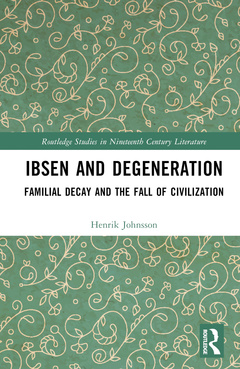Description
Ibsen and Degeneration
Familial Decay and the Fall of Civilization
Routledge Studies in Nineteenth Century Literature Series
Author: Johnsson Henrik
Language: English
· 15.2x22.9 cm · Hardback
Description
/li>Contents
/li>Readership
/li>Biography
/li>
Introduction
Morel and the rise of degeneration discourse
Marriage, family, and incest
Disease, diathesis, and syphilis
Energetic economy and the fixed fund of energy theory
What does Ibsen do with degeneration discourse?
A note on the form and scope of the book
Chapter 1. The Rot of the Bourgeois Body: Ghosts (1881)
Ibsen’s commentary on Ghosts
The raising of bourgeois children
Class, health, and sex
Bourgeois patriarchy and Helene’s independence
Alving’s decline and fall
Osvald’s energetic inheritance
Regine and regeneration
Chapter 2. The Fall of the Old Order: Rosmersholm (1886)
Hvide heste and its relationship to Rosmersholm
Rosmer, Kroll, and the fall of the old order
Marriage as the scene of threats to the social fabric
Strength and weakness of will
Brendel and the forces of entropy
The useless deaths of Rosmer and Rebekka
Chapter 3. Dominance and Deviance: Hedda Gabler (1890)
August Strindberg’s “For Payment” as intertext
Degeneration in Ibsen’s notes to Hedda Gabler
The question of Hedda’s sexuality
Tesman as failed patriarch
Hedda’s need for domination
Løvborg’s loss of manhood
Sexual competition and exclusivity
Hedda’s wasteful death
4. Conclusion
Henrik Johnsson is professor of Nordic literature at Østfold University College, Norway. He holds a PhD in the history of literature from Stockholm University. He is the author of two monographs on the oeuvre of August Strindberg, Strindberg and Horror: Horror Motifs and the Theme of Identity in the Works of August Strindberg (2009) and The Infinite Coherence: August Strindberg’s Occult Science (2015). He is co-editor with Tessel M. Bauduin of the anthology The Occult in Modernist Art, Literature, and Cinema (2018). His current research explores the intersection of horror and desire in Nordic Gothic fiction.
These books may interest you

Ibsen in Context 115.27 €



